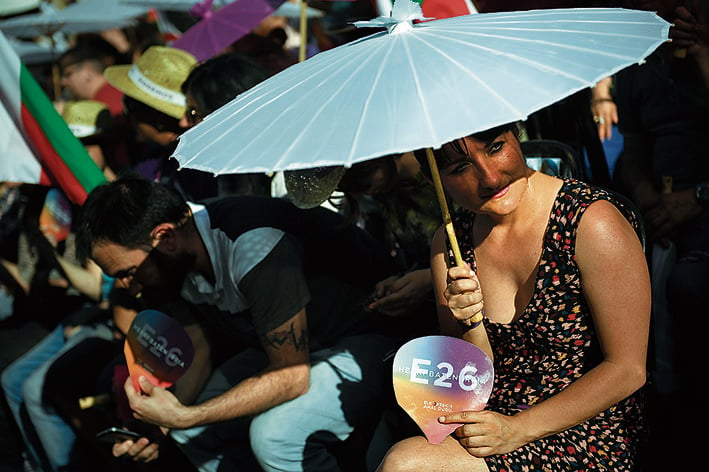Analysis
A feminist guide to Podemos
If Podemos really wants to be progressive, it’s going to have to be intersectional and inclusive, feminists argue.

Podemos is divided. Crumbling under strategic disputes, discussions on the composition of the governing bodies, and caught between those who give up and those who bark, Podemos is stuck looking at its navel.
Bonds of friendship were destroyed. The activists who first changed the political system were eaten by it later. Yet, some form of party and a leadership team will have to come out of the Citizen Assembly elections this weekend.
The feminists within Podemos do not want to miss this opportunity. They’re calling it a historic opportunity and are working side by side not to allow feminism to be, once again, the good and fair cause that is always postponed. In this transition process, they’re demanding the recognition of feminism’s political power, avoiding its manipulation and ensuring its autonomy. This can only be achieved by questioning the male networks that are always trying to keep women out of politics.
The “Ruta Morada” document compiles the women’s contribution to the party structure and its policies. Morada means purple, the typical color of the violet multitudes of Spanish women and characteristic of Podemos. Ruta is the road, which started with the elections that led the feminists to the government of the largest Spanish cities. It led to the demonstrations against male violence against women, it has led feminists within the party to denounce their idea of economy, administration, and management of public affairs and to remove patriarchy from Podemos and its surrounding movements, pushing for a change in practices and forms from the bottom up.
They well know that political parties mirror the power dynamics of everyday life. The document, by incorporating the many demands formulated in diverse forums and meetings, becomes a point of reference for a plural feminism. But it is not a candidacy for leadership. It goes beyond that.
It ranks as a political entity in the Citizen Assembly — in fact, it steals the spotlight. It emerges as an alternative and becomes a common thread. If anybody wants to incorporate the proposals of Ruta Morada into another document, he or she can do it. Then, the other document gets contaminated for declining its proposals from a feminist approach, altering not only the balance of power, but the content of the dispute and the narrative tension.
The analysis starts from the change Spain is experiencing, the result of several simultaneous, interconnected and interdependent crises: an economic crisis, a crisis of representation, an ecological crisis and a crisis of rights. These crises have had a greater impact on women and have worsened the already existing inequalities.
According to the vision outlined by the Podemos feminists, there are many challenges. They propose decentralization, territoriality and pluri-national nominating bodies as political territories. And the nexus of all of them is the right to self-determination, because there cannot be gender justice without equality and without radical democracy. It calls for greater presence of suburban territories and suburban themes within the organization and political discourse, to build a new collective center, to confront a locus of thought that, too often, is all male.
It points out the common practices and forms of participation. It starts again from the popular slogan “the personal is political” to point directly to the idea that whatever is done in private life must be replicated in public life. Cooperation, participation, diversity and sustainability of life must have a real impact in the party to make it happen in the society they want to build.
The Podemos feminists never speak of one feminism, nor of a universal sisterhood, but multiple feminisms. Intersectionality as an essential political principle for a real exchange. Because social identities overlap and intersect. Women do not exist as an abstract category, but as individuals with different features that need to be taken into account.
Migrants, old, young, disabled, temp workers, poor, rich, unemployed, gypsy and more. All forms of gender and sexual orientation. Intersectional methodology is now essential to understand the diversity and needs. It is an instrument of feminist analysis, practice and dialogue, and it’s used to meet the needs of the community as a whole and the need to rehabilitate the heart of politics and institutions.
Feminists have written an intriguing instructional booklet. It’s best not to give it a cursory reading, looking for something to copy and paste, thinking you already know how to make it all work.
Originally published at https://ilmanifesto.it/podemos-le-femministe-plurali-sulla-ruta-morada/ on 2017-02-10
